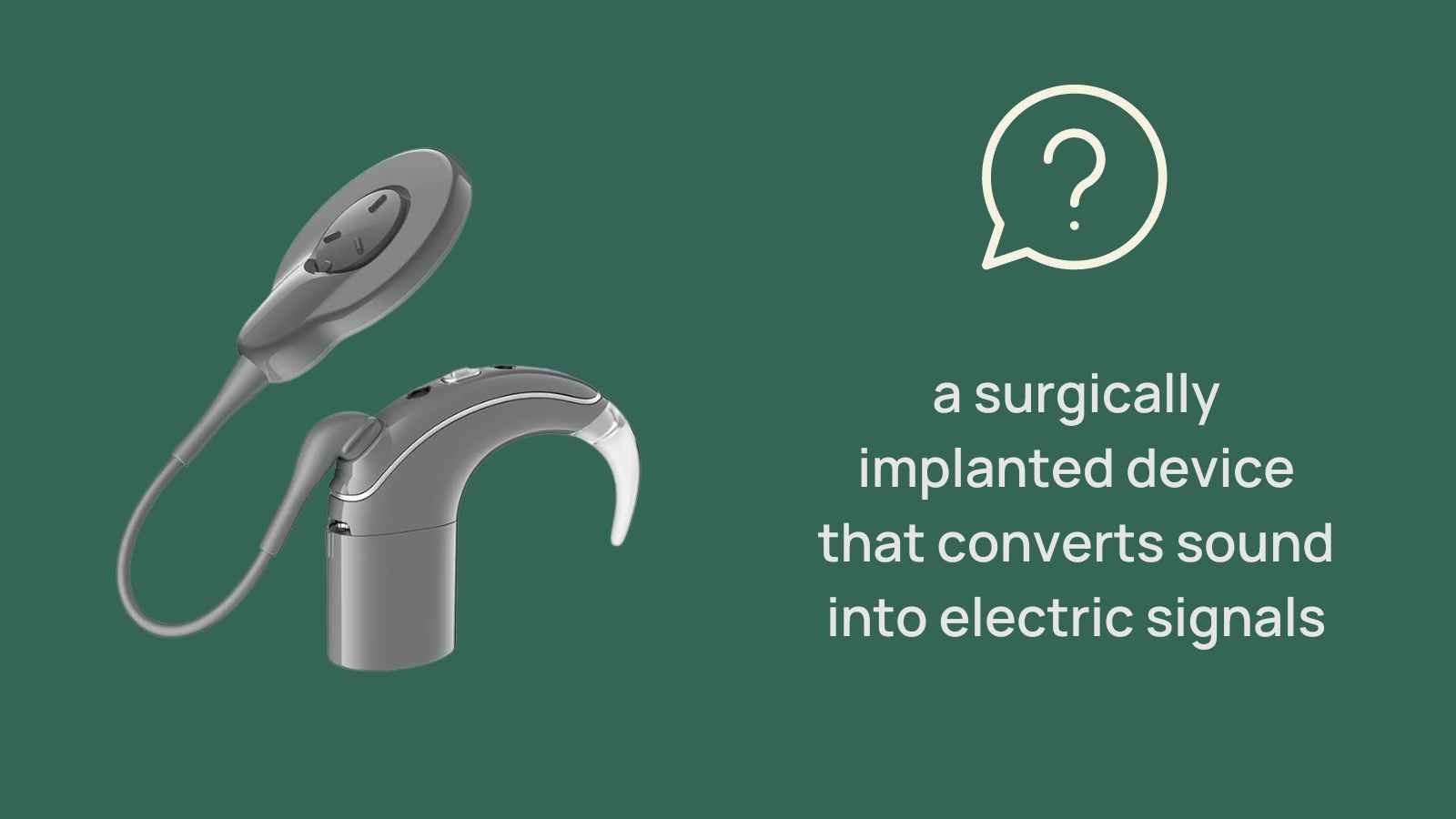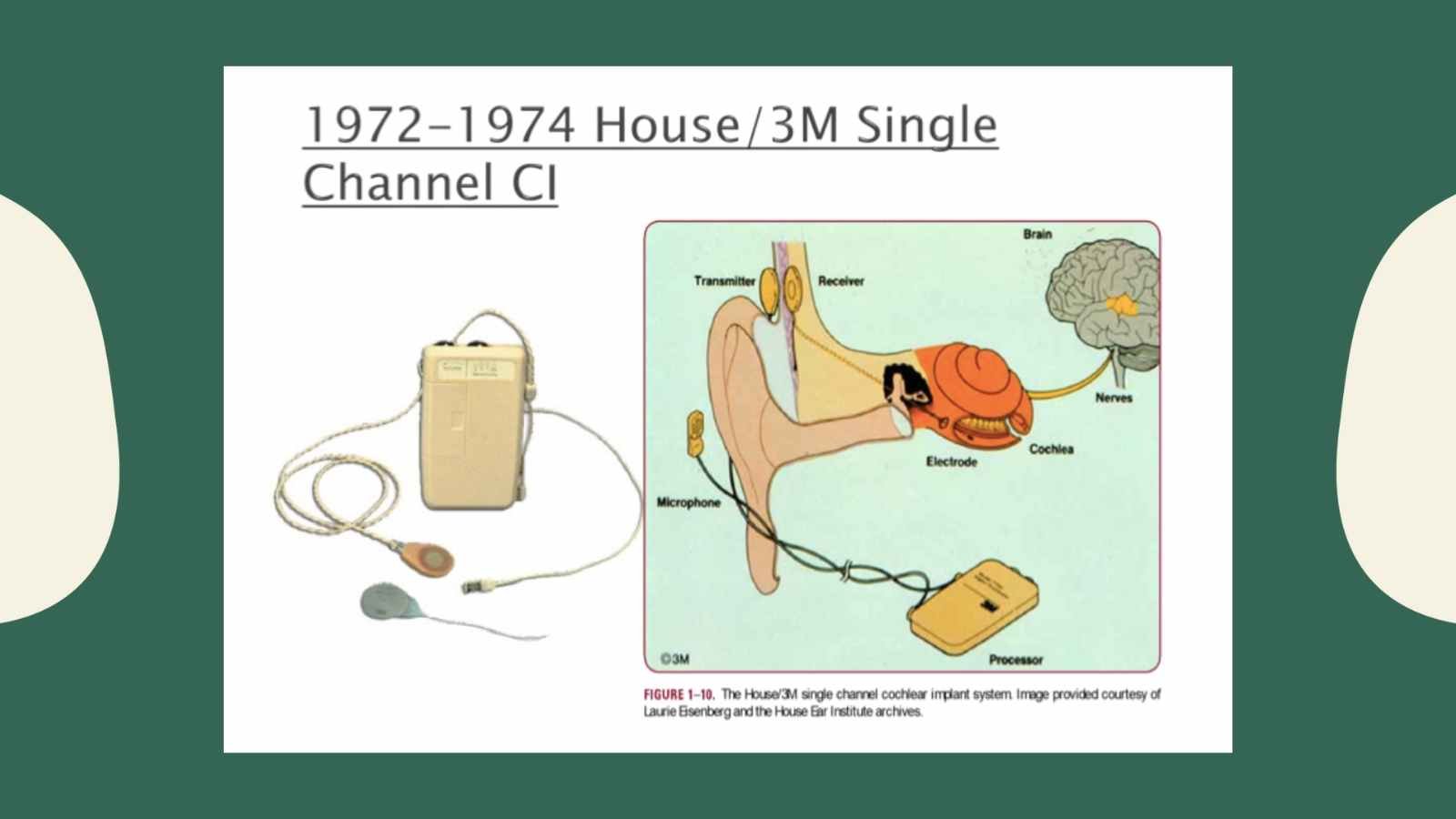Key Takeaways:
- Cochlear implants first came about in the 1970s.
- The speech processor that is worn behind the ear today is much smaller than the pieces worn in the 1980s, and today both children and adults can wear them.
- Cochlear implants are appropriate for individuals with a moderate to profound hearing loss who no longer benefit from hearing aids.
.png)
Cochlear implants are electronic medical devices that can assist those with hearing loss for whom hearing aids no longer help. These devices are surgically implanted into the ear and worn with an external speech processor, which enables someone to detect sound and understand speech better.
Whether you’re considering getting a cochlear implant or learning more about it for a loved one, here is practically everything you need to know about the device.
What is a cochlear implant?

A cochlear implant is a surgically implanted device that converts sound into electric signals. These signals are sent to an internal component like a radio tower and then directly to the auditory nerve within the inner ear. Essentially, this device lets people with severe hearing impairment access sound and speech.
For some background, the first single-channel cochlear implant was developed in 1972 by the House Ear Institute/3M. At the time, this electronic equipment was proof of concept at the time but it didn’t have the functionality to allow for speech understanding. Later on in 1978, Rod Saunders was the world's first multiple-channel cochlear implant recipient in Melbourne, Australia. (FYI: It wasn’t until the early 1980s—in 1983 to be exact—that the University of Iowa followed suit.)
This new option was a revolutionary technological advance and it paved the way for speech understanding with a cochlear implant processor. During that time, adults were only implanted in one ear. Since then, cochlear implants have continued to evolve more and more. Today, children born with profound hearing loss are implanted as infants and have the opportunity to learn speech and language alongside their normal-hearing counterparts.
Currently, there are several different styles of cochlear implants available on the market, such as traditional and hybrid cochlear implants. A hybrid cochlear implant uses natural acoustic, low-frequency hearing and electric stimulation for high frequencies.

How do cochlear implants work?

Cochlear implants transform external sounds into electrical signals sent directly to the auditory nerve. This bypasses any damaged parts of the inner ear, and provides folks with severe hearing loss access to sound and speech without relying on distorted or amplified audio from hearing aids.
The external portion of the device consists of two parts: A microphone and a processor worn behind the ear, which collects sound waves from one's environment and an antenna attached by magnets that transmits these signals into an internal receiver/stimulator implanted behind the ear and underneath the skin. Basically, think of this device as a miniature radio tower sending a signal. After that, the electrodes send these signals directly to the auditory nerve, which is then processed as sound by the brain.
At night, the speech processor is removed. Most speech processors today use rechargeable batteries, which are easily charged each night just like a cell phone or common hearing aid.
However, it's important to note that when the speech processor is removed from your head, you won't be able to hear anything
Who should get a cochlear implant?

Cochlear implants are intended for people with hearing loss who no longer receive adequate benefit from a hearing aid. Most commonly, this includes those born with congenital deafness or those who have had progressive hearing loss due to age or illness. More recently, those with sudden sensorineural hearing loss (aka, damage to the inner ear and nerve pathways) may also consider a cochlear implant.
In order to verify if you’re a candidate for this device, schedule a cochlear implant evaluation with a specialist, and during this visit the doctor will review audiological and surgical candidacy.
Who is a good candidate?

Both adults and children can successfully wear cochlear implants. Check out the cochlear implant candidacy standard criteria and get deeper insights.
Adults
- Moderate to profound sensorineural hearing loss in both ears
- Poor speech understanding, as defined by preoperative test scores of ≤ 50% sentence recognition in the ear to be implanted and ≤60% in the opposite ear or both ears.
Children (2-17 Years)
- Severe to profound sensorineural hearing loss in both ears
- Limited benefit from binaural amplification
Children (9-24 Months)
- Profound sensorineural hearing loss in both ears
- Limited benefit from binaural amplification
In addition to the audiological criteria above, it's essential to have support from family and friends during the process. And, anyone considering cochlear implantation should clearly understand the aural rehabilitation process (i.e. strategies and tactics that can improve communication-based activities for people with hearing loss).
Is it normal to go from hearing aids to cochlear implants?
Hearing loss progression varies from person to person. It’s individualized, so some conditions remain stable for years and benefit from hearing aids. While other people may experience a hearing decline, and hearing aids can present limitations in terms of audibility and speech understanding.
Generally speaking, anyone considering a cochlear implant should have a hearing aid trial before pursuing a cochlear implant. However, others can experience sudden or profound hearing loss and choose a cochlear implant to restore hearing to the affected ear. In this case, a hearing aid would not provide adequate benefit.
How does the process of getting a cochlear implant work? Who do I call?
To qualify as a cochlear implant candidate. This evaluation will consist of several parts and last several hours. This evaluation will include the following:
- History and physical exam with an ENT or neurotologist (ear surgeon)
- Audiogram (done in a sound booth without hearing aids)
- Verification or existing hearing aids or programming loaner hearing aids
- Speech testing in the sound field while wearing hearing aids
- Imaging, such as a CT scan or MRI
- Consultation with an audiologist to explain the process
- If indicated, you will then select the device and accessories
- Some clinics also assess pre-operative inner ear balance function
Interested in learning more? Reach out to a local neurotology, ear clinic, or one of the cochlear implant manufacturers to start the process:
Cochlear implant manufacturers can also connect you with people who have been through the process for additional support.
What is the surgery like? What about recovery and adjustment?
To begin, this surgery is an outpatient procedure that lasts several hours and most patients can go home on the same day.
A physician may prescribe medication to help manage swelling or discomfort for several days following surgery. However, many patients tolerate the procedure and feel relatively normal after the anesthesia wears off. Keep in mind that you will not hear better immediately after surgery, as the cochlear implant will still need to be activated following implantation.
One week after the surgery, you will have a follow up exam to ensure the incision site is healing properly. About four weeks later, you visit the audiologist for the cochlear implant activation. At first, the sound may seem mechanical or sound like noise, but this is very normal.
Eventually, the sound will become much more natural as the brain begins to adjust to what the world sounds like through a cochlear implant. To help this process, you'll want to spend some time every day doing listening practice with the cochlear implant. For example, try reading a book out loud to yourself or listening to an audiobook. These exercises can help your brain connect new sounds with meaning.
Most clinics will schedule you back within a few weeks of the activation and then again in three months, six months, and 12 months. After the first year, most implant users will have reached their baseline and may only need annual programming appointments.
Are cochlear implants usually successful?
There are two points to discuss here: surgical outcomes and performance outcomes. In terms of surgical success rate, cochlear implants have a high success rate, with a 2020 study showing less than 0.5% medical failure over a 30-year time period.
And for performance outcomes, there is a range of variability in how cochlear implant users perform. Investing time daily in the rehabilitation process is an integral part of any patient's success with the device.
It is vital to be patient with yourself and take it one step at a time. What it sounds like at activation differs from what it will sound like after six months to a year of regular wear.
In my professional experience, patients see the most significant improvement in sound quality and speech understanding within the first 180 days (or six months), with additional improvement in background noise in that first year. I often ask patients to reflect on the process at the one-year mark, and nearly every patient says it was worth pursuing.
What are the risks and side effects of cochlear implants?

The cochlear implant procedure is safe and rarely has consequences. But, as with any surgical procedure, there are risks involved. However, the incidence of complications from cochlear implant surgeries is low. Adults who are healthy enough for surgery typically tolerate the procedure well.
Risks can include:
- Injury to the facial nerve
- Changes in taste (usually temporary)
- Dizziness or imbalance
- Meningitis
- Numbness around the incision site
In order to reduce the risk of meningitis, your physician will want proof of vaccination. There is also the possibility of taste changes, which stems from the proximity to the chorda tympani in the middle ear space. If this does occur, it is usually temporary.
Have specific questions or concerns? It’s a good idea to talk through those points with your ear surgeon. Patients with uncontrolled diabetes or previous anesthesia-related complications should consult with a physician regarding their situation and whether they are fit for surgery.
Does insurance cover cochlear implants? Are there programs for those who are uninsured?
Each insurance plan is different and coverage can vary by the insurance policies and plan benefits. The good news is that many insurance plans do cover the cost of cochlear implants, medicare covers cochlear implants for those who meet candidate criteria, and Medicaid typically covers them as well.
To estimate out-of-pocket expenses, you’ll need to confirm with your insurance regarding any coinsurance, copays, or deductibles. As for what to expect, check with your insurance on coverage or out-of-pocket costs for the following:
- Hearing evaluation
- Implant component costs (sound processor and implant)
- Implant procedure costs (surgery, anesthesia, and related costs)
- Follow up visits and care
- Battery costs
If you’re currently uninsured, you may look into your state health insurance marketplace or Medicaid coverage. Additionally, if you have served in the US military, you may qualify for a cochlear implant through the Veterans Affairs (VA) office. Another option is finding specific charitable organizations in your state. For Colorado residents, the Colorado Neurological Institute offers a cochlear implant assistance fund.
Read our full guide to Cochlear implant costs here.
How long do cochlear implants last?
The internal component of the cochlear implant is designed to last for a lifetime and many cochlear implant manufacturers offer a 10-year warranty on the internal portion. The device survival rate at the 10-year mark is estimated at 97.7%, and in rare cases the internally implanted portion may be replaced.
The external speech processor will typically be upgraded every five years, and cochlear implant manufacturers design them to be backward compatible (meaning, the internal component will be compatible with the latest external speech processor).
What are the top cochlear implant brands?
Cochlear Americas, Advanced Bionics, and Med-El are the leading cochlear implant manufacturers. Each company has a portfolio of implantable hearing devices that are FDA approved. When you meet with your cochlear implant team, they will discuss the differences between the brands and help you select the right option.
Who can perform cochlear implant surgery?
A cochlear implant surgery is a surgical procedure performed by a physician trained in ear surgery (otology, neurotology, and skull base surgery).
Final Thoughts
Cochlear implants have come a long way since their inception in the 1960s and they offer unprecedented access to sound and speech for countless individuals worldwide with severe hearing impairment or even complete deafness due to damage in their ears or auditory nerves.
Understanding how the devices work, who they’re best intended for, what types are available on the market, what goes into getting an implant, the risks associated with them, and the success rates will all help ensure you make an informed decision when it comes time to decide if this type of procedure is right for yourself or a loved one. Be sure to do your research thoroughly to make an educated decision on whether cochlear implants are suitable for your situation.






